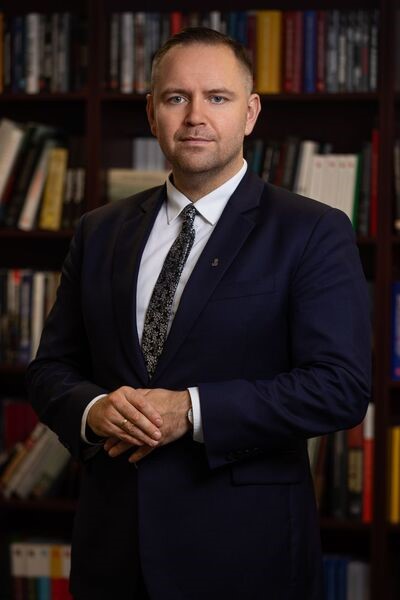The authorities of the Russian Federation have been consistently distorting historical facts to justify their current aggressive policy. Poland is central to this mystification, writes Karol Nawrocki, Ph.D., President of the Institute of National Remembrance, in an article published on 16 February 2024 in press titles belonging to the Polska Press Group.
When I was visiting the Central Museum of the Great Patriotic War of 1941-1945 in Moscow a good few years ago, I peeked into the museum souvenir shop. Apart from caps with a red star, the offer included figurines of Vladimir Lenin and Felix Dzerzhinsky, among others. This is the sad truth: the leaders of the bloody Bolshevik Revolution and architects of the genocidal Soviet system are still treated in Russia as heroes, becoming part of pop culture.
When the communist system collapsed in Poland in 1989, one of the symbols of change was the toppling of the despised monuments to Lenin and Dzerzhinsky. However, some of the Soviet propaganda objects – mainly those erected “in honour of the Red Army” – survived the period of political transition. In March 2022, shortly after Russia’s full-scale aggression against Ukraine, I appealed to local authorities to complete the decommunization of the Polish public space. The response was significant. Out of roughly sixty Soviet propaganda objects that were still marring Polish cities and towns two years ago, more than half have been removed so far. From the perspective of the Russian Federation, such actions are dangerous because they tear down the myth of the Soviet “liberators” and undermine Moscow’s “rights” to dominate the lands reached by soldiers with the red star on their caps.
At the Institute of National Remembrance, which I have the honour to manage, it is clear to us that names and symbols commemorating totalitarian regimes have no place in free and democratic Poland. However, the authorities of the Russian Federation apparently believe that the former Eastern Bloc countries, now sovereign, do not have the right to choose their own heroes. In recent days, I discovered that I am on Russia’s wanted list, along with Estonian Prime Minister Kaja Kallas and Lithuanian Minister of Culture Simonas Kairys. We are accused of “desecration of historical memory”. That is how Russia and Putin see telling the truth about the Soviet enslavement and the terror it brought to Central and Eastern European countries.
We were recently lectured on “proper” historical memory by Vladimir Putin himself. In a two-hour interview with Tucker Carlson – an American journalist who, for long stretches, merely nodded to the Kremlin host – a peculiar conception of the past was no less important than the present and was used to validate the current aggressive policy of the Russian Federation. In his arguments, Putin went all the way back to 862, but he also covered a lot of recent history. The purpose of all this was to prove the reckless thesis that Ukraine is an artificial “Nazi” state, and thus – that the brutal war waged by Russia against the authorities in Kiev and the Ukrainian society is justified.
It is no coincidence that Poland plays a key role in Putin’s attempt to rewrite history After all, the entire propaganda narrative of “reuniting the Russian lands” and “liberating” Europe from Nazism requires an extensive manipulation of Polish history.
The Republic of Poland was partitioned by its aggressive neighbours three times: in the 18th century, when the lands of the then Polish-Lithuanian Commonwealth were divided by Russia, Prussia, and Austria; in 1815, when, following the collapse of the Napoleonic system, the three powers dismembered Polish territory anew (Warsaw, among others, came under Russian rule at that time); and again in 1939, when Poland was wiped off the map of Europe by the Third German Reich and the Soviet Union side by side. Neither Tsarina Catherine II in the 18th century nor Joseph Stalin a century and a half later managed to take back “their historical territories”, as Putin would like the world to believe. Lutsk did not return to the motherland in 1795, nor did Lviv in 1939 (the latter was under Austrian rule during the partitions). To claim otherwise, one would have to erase these cities’ state links with the multinational Commonwealth. Or, like Putin, assume that Ukrainians are actually Russians and the Poles tried to artificially create a Ukrainian nation (sic!).
Equally ludicrous are the attempts to shift responsibility for the outbreak of World War II onto Poland. The President of the Russian Federation, on the one hand, accuses the Warsaw authorities of collaborating with Adolf Hitler, and on the other hand, of rejecting his supposedly legitimate territorial claims.
The truth is different: pre-war Poland was caught between two totalitarian states, the German Reich and the Soviet Union, that did not recognize the established European order. The authorities in Warsaw tried to maintain peaceful relations with both of them. They made a non-aggression pact with the USSR and signed a declaration of non-violence with Germany. For Hitler and Stalin, however, these facts did not matter. In 1939, the two dictators made a vicious pact, dividing the region between them in a secret protocol. The result was World War II, which began with the Wehrmacht’s invasion of Poland, followed by the Red Army’s attack two and a half weeks later. Both occupiers quickly terrorized the conquered lands, with Auschwitz and Katyn becoming symbols. Both occupiers also acted in unison until June 1941.
The defeat of the Reich, still hailed in present-day Russia as a great victory over fascism, meant further enslavement for the Central and Eastern European nations, this time by the Soviets. However, today’s authorities in Moscow do not want to hear about it. In April 2022, they dissolved the Memorial Society, which played an instrumental role in reminding Russians of the victims of communism. Today, they want to silence those who proclaim inconvenient historical truths abroad. The Kremlin has one word for such people: fascists.
Karol Nawrocki, Ph.D., President of the Institute of National Remembrance
